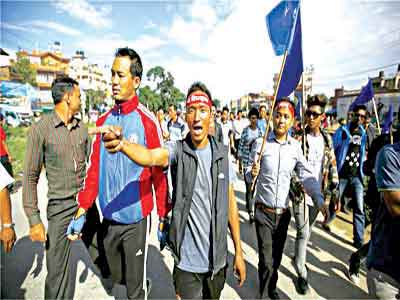Nepal draft protests kill nine
At least seven policemen, including a senior officer were killed during clashes between protesters against Nepal’s new constitution and security personnel in the country’s western Kalali district on Monday, a police spokesman said. Demonstration also broke out in two other districts.
“We have heard reports that…three protesters have also been killed, we are trying to confirm the details”, he added.
Local media said thousands of protesters attacked police with axes, spears and bricks, although this could not immediately be confirmed. “Inspector Ram Bihari Tharu of the Armed Police Force was burnt alive”, he said.
Schools and colleges were closed, markets remained partially shut and vehicular movement was thin in the capital city as supporters of the Nepal Federation of Indigenous Nationality enforced general strike to press their demands for more rights and representation in the new Constitution.
But home minister Bam Dev Gautam has responded by appealing for peace, calling “on people to not be involved in activities that disturb social harmony and ignite ethnic hatred”.
Nepal’s final version of constitution has been tabled at the Constituent Assembly (CA) meeting for deliberations among parties.
The Himalayan nation has been witnessing series of protests for a few weeks over the proposed number and delineation of federal provinces and demands to be included in the new constitution.
Yesterday’s clash erupted after the protesters tried to defy the curfew and the prohibitory order issued by the district administration in Tikapur and Durgauli areas.
However, the addition of a seventh province has failed to appease marginalised communities.
Hundreds of security forces were mobilized in the area to defuse the prevailing tense situation.
Nepalese police arrest a supporter of opposition political parties during a protest against the draft constitution in Kathmandu on August 15, 2015.
They are also protesting the proposed borders of the new federal units in Nepal, which they say, discriminate against the historically marginalised communities, including the Madhesis and Tharus.
Work on a new national constitution began in 2008, two years after the end of a decade-long Maoist insurgency that left an estimated 16,000 people dead and brought down the 240-year-old Hindu monarchy.








